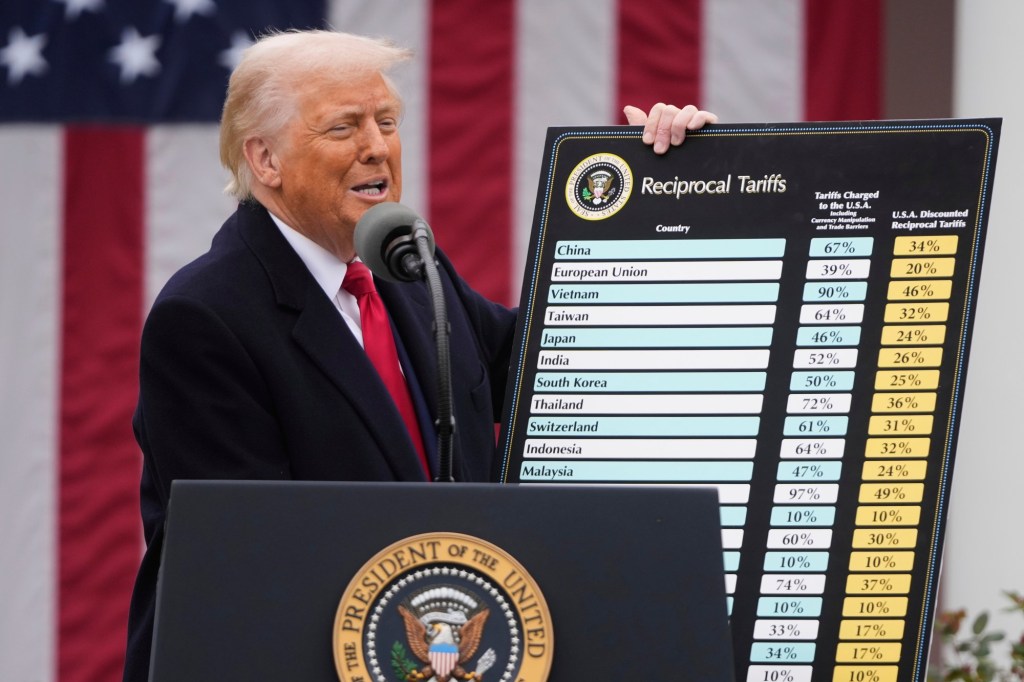
SACRAMENTO—After the markets experienced a dramatic rebound on Wednesday, President Donald Trump praised himself for the historic financial upswing. That was the equivalent of setting yourself on fire, jumping in a swimming pool and then touting your firefighting skills. By the time you read this, it’s anyone’s guess where stocks will be. Right now, they are sliding again and are well below where they were before the tariff debacle.
The market reaction was an odd coincidence. Every time Trump threatened to impose tariffs that would create massive new taxes on U.S. consumers, disrupt supply chains and destroy import-dependent businesses, the markets tanked. Then whenever he backed away, delayed or pared back their scope, the markets rebounded. It’s almost as if there’s a connection. Nevertheless, markets hate uncertainly—and businesses can’t adjust to ever-changing trade edicts.
Maybe investors know something that the administration’s oddball collection of economic ideologues and mystics don’t understand. One financial-services firm sent a message offering “support” during the tumult. I didn’t know investment banks had staff psychologists, but all investors will likely need one at this rate. Even if Trump were a font of intelligence and wisdom (hint: he’s not), no one person should be directing any country’s economy.
The Trump team couldn’t even get its talking points straight. MAGA told us the increases would bring back manufacturing jobs and create prosperity. When markets freaked out, they told us, sure, there would be pain and we had to get used to eating turnips rather than fresh fruits from Mexico. Some MAGA influencers even said the policy would build manliness.
Then when Trump backed off, his minions claimed it was all part of a 4D-level chess negotiating strategy designed actually to eliminate tariffs and create “fair” trade. If you’re arguing for tariffs and then pivoting to “it’s a negotiating ploy,” then you need to reexamine your intellectual consistency. The former assumes they are good; the latter that they’re fundamentally bad.
The whole “fair” trade concept is Orwellian. In a free-market transaction, the only fairness that matters is whether a buyer thinks the deal is fair and whether the seller also believes the deal is fair. I have no interest in first investigating that business’ entire supply chain to worry about whether every person involved throughout the process meets some subjective standard, although it’s fine to only buy stuff from companies one likes.
If we only traded with people who endorsed the same regulations and had the same living standards as us, we wouldn’t trade with anyone outside our own family—and even that’s not certain. Some exceptions apply—e.g., it’s laudable to assure the overseas factories don’t engage in slave labor(defined as forcing people to assemble products rather than earning wages we find too low) or if there’s some actual direct foreign-policy threat.
Those who say they support “fair trade” are really saying they oppose open trade but are too skittish to admit it so they use this lingo. Requiring “fair” trade means letting the government determine the calculus. That results in interest groups (such as unions) determining it based not on any normal definition of fairness but based on what advances their interests. It’s an assault on our freedom. Tariffs and “fair” trade centralize decisions in politicians and bureaucrats—something we saw on spectacular display.
By handing one person tariff power, we give that person the means to boost or destroy the economy based on whim. As Trump said last week, “I’m telling you, these countries are calling us up, kissing my as**. They are dying to make a deal. ‘Please, please, Sir, make a deal. I’ll do anything. I’ll do anything, sir.’” The beauty of the market is it’s decentralized. It reflects the individual decisions of billions of people. Authoritarian systems vest that power in one person or small cadre.
Trump isn’t shy about using his influence to peddle access, sell overpriced Chinese-made trinkets or get government favors for his company, so we shouldn’t be surprised by this crony-capitalist tilt. Of course, companies that bend the knee get privileges and exemptions. Tariffs also can potentially lead to corruption. We’re seeing congressional calls for insider-trading investigations to find out what anyone knew beforehand and whether it guided any investment decisions.
And MAGA should stop bemoaning trade deficits, or at least better understand them. As many economic observers explain, rich countries usually (but not always) run trade deficits because rich people buy more stuff than poor people. If you become poor, you’ll be selling your assets to survive rather than buying consumer goods.
Some Americans voted for Trump because they thought he’d be better for the economy than the alternative. Many of his supporters, however, love chaos and want him to blow up the existing political, international and economic order. The latter are winning—and it won’t stop until Congress takes away the car keys.
Steven Greenhut is Western region director for the R Street Institute and a member of the Southern California News Group editorial board. Write to him at sgreenhut@rstreet.org.
Originally Published:



